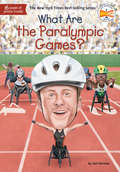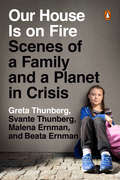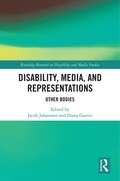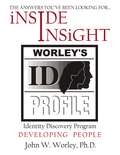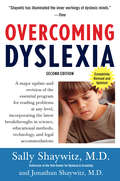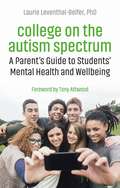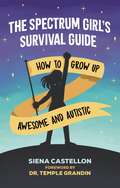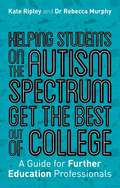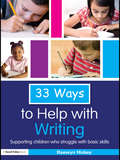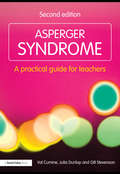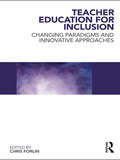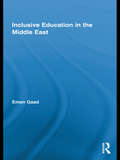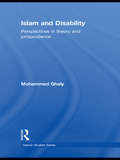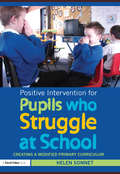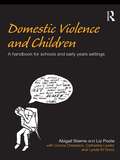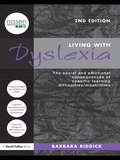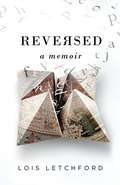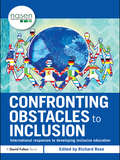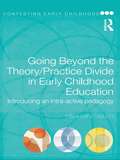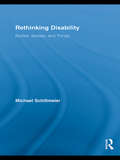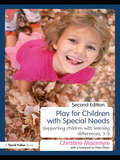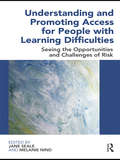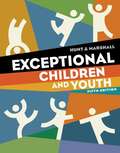- Table View
- List View
Daniel Kish: A Different Way to See (Fountas & Pinnell Classroom, Guided Reading)
by Julius SmithersonNIMAC-sourced textbook. CHANGING IDEAS ABOUT BLIND PEOPLE. Daniel Kish is blind, but he learned how to see things around him. Now he's teaching blind children how to see too.
What Are the Paralympic Games? (What Was?)
by Gail Herman Who HQIt's time to cheer for the inspiring athletes of the Paralympic Games! As the Opening Ceremony for the 1948 Summer Olympic Games commenced in London, a similar sporting competition was taking place a few miles away. But the men at Stoke Mandeville weren't your typical athletes. They were paralyzed World War II veterans. The games at Stoke Mandeville were so successful that they would eventually lead evolve into the Paralympics. Participants from all around the world vie for the gold medal in a variety of sports, including archery, basketball, swimming, speed skating, and ice hockey. Author Gail Herman highlights their achievements, describes how these athletes train--both mentally and physically--for the games, and gives the reader a better understanding of what makes the Paralympic Games one of the world's most viewed sporting events.
Our House Is on Fire: Scenes of a Family and a Planet in Crisis
by Greta Thunberg Svante Thunberg Malena Ernman Beata Ernman"A must-read ecological message of hope . . . Everyone with an interest in the future of this planet should read this book." --David Mitchell, The GuardianWhen climate activist Greta Thunberg was eleven, her parents Malena and Svante, and her little sister Beata, were facing a crisis in their own home. Greta had stopped eating and speaking, and her mother and father had reconfigured their lives to care for her. Desperate and searching for answers, her parents discovered what was at the heart of Greta&’s distress: her imperiled future on a rapidly heating planet. Steered by Greta&’s determination to understand the truth and generate change, they began to see the deep connections between their own suffering and the planet&’s. Written by a remarkable family and told through the voice of an iconoclastic mother, Our House Is on Fire is the story of how they fought their problems at home by taking global action. And it is the story of how Greta decided to go on strike from school, igniting a worldwide rebellion.
Disability, Media, and Representations: Other Bodies (Routledge Research in Disability and Media Studies)
by Jacob Johanssen Diana GarrisiBringing together scholars from around the world to research the intersection between media and disability, this edited collection aims to offer an interdisciplinary exploration and critique of print, broadcast and online representations of physical and mental impairments. Drawing on a wide range of case studies addressing how people can be ‘othered’ in contemporary media, the chapters focus on analyses of hateful discourses about disability on Reddit, news coverage of disability and education, media access of individuals with disabilities, the logic of memes and brain tumour on Twitter, celebrity and Down Syndrome on Instagram, disability in TV drama, the metaphor of disability for the nation; as well as an autoethnography of treatment of breast cancer. Providing a much-needed global perspective, Disability, Media, and Representations examines the relationship between self-representation and representations in either reinforcing or debunking myths around disability, and ways in which academic discourse can be differently articulated to study the relationship between media and disability. This book will be of interest to students and researchers of disability studies and media studies as well as activists and readers engaged in debates on diversity, inclusivity and the media.
Inside Insight: Worley's Identity Discovery Profile (WIDP)
by John WorleyWho are you? Wouldn't you like to be authentic?&“INSIDE INSIGHT!&” By the time you finish reading this book, YOU will be a NEW PERSON!Most people have no idea what they want. Then again, for that matter, who they are. That is causing a world of hurt.The outcome from Dr. Worley is a ground-breaking psychometric assessment, Worley&’s ID Profile (WIDP). WIDP used with overwhelmingly positive reviews by corporate leaders, HR Departments, clinicians, churches, schools, sports teams, families, and individuals.In this book, Dr. Worley speaks about how he developed WIDP, why it is radically different from other profiling systems, and how you can use it to help align your outer persona and behavior with your inner expectations. WIDP concretely identifies what you "prefer and do not prefer from others.&” This crucial proof will help enhance your quality of life, and "You will see yourself on the pages of your profile.&”Having completed thousands of profiles I ALWAYS get responses like, &“WOW, how can you get this much information from those questions?&” or &“I can&’t believe how accurate this is about me!&” or &“I wish I had this information when I was younger!&” or &“I want to profile my whole family.&”Let&’s say you are one of those individuals that have always felt uncomfortable being around many people and don&’t like to socialize. GUESS WHAT? Most of society is like that! That is why no one talks on elevators or in doctor&’s offices. It just happens to be your unique temperament. It is &“OK&” for you to feel that way because that is who you are so, leave yourself alone and enjoy the recluse life. You are one of those people who live in their head, thinking, creating, dreaming and inventing ideas. Most people go through life not being able to identify with their true inner desires. You are one of a kind, unique person and that makes you very special.Then there is the temperament that has the innate desire always to be leading others, making decisions, and being in control. They are natural-born leaders and, like cream in milk, will always rise to the top of an organization. You are naturally gifted as a leader and have innate ability to lead armies. If you cannot lead where you are, you will move to another position. You will be anxious until you land in a governance spot. Once you find that position, you will be fulfilled.Then there are the peacemakers, servants, and cheerleaders! The peacemakers balance out everyone and maintain harmony. They are great arbitrators and have a comedy streak. The servants are loyal and committed to working until the task is completed. They are proficient and quiet. They are invaluable. The cheerleaders are the socialites who make the world exciting and fun. Without them, life would be boring. We need them, and they want all of us to be open to them and to be their friends. They are very colorful and expressive and, very open in their communications.We&’re different! Appreciate your temperament. You are VERY important!Expect miracles.
Overcoming Dyslexia: A New and Complete Science-based Program for Reading Problems at Any Level
by Sally ShaywitzFOR EVERYONE WHO STRUGGLES TO READ! Clear, practical, science-based information and advice for successful results. One in five American children has trouble reading. But they are not stupid or lazy. In Overcoming Dyslexia, Dr. Sally Shaywitz, co-director of the Yale Center for the Study of Learning and Attention and a leader in the new research into how the brain works, offers the latest information about reading problems and proven, practical techniques that, along with hard work and the right help, can enable anyone to overcome them. Here are the tools that parents and teachers need to help the dyslexic child, age by age, grade by grade, step by step.--What dyslexia is and why some intelligent, gifted people read slowly and painfully--How to identify dyslexia in preschoolers, schoolchildren, young adults, and adults--How to find the best school and how to work productively with your child's teacher--Exercises to help children use the parts of the brain that control reading--A 20-minute nightly home program to enhance reading--The 150 most common problem words-a list that can give your child a head start--Ways to raise and preserve a child's self-esteem and reveal his strengths--Stories of successful men and women who are dyslexic.
College on the Autism Spectrum: A Parent's Guide to Students' Mental Health and Wellbeing
by Laurie Leventhal-BelferProviding expert yet accessible guidance to parents of young autistic people who are going to college, this book helps parents support their child from application through to graduation. Covering social issues, independent living, academic challenges, student services and emotional wellbeing, this is the one-stop shop for advice on the transition from school to college or university. The book examines the skills that students need to live and function at college, and the skills parents need to let their teens navigate college without a parent as intermediary. It offers ways to combat common problems that affect the mental health of people on the spectrum, such as keeping up with homework, fast-paced classes, and complex social expectations. This book is for any parent considering college as an option for their child, disability service providers in colleges and for autistic students themselves.
The Spectrum Girl's Survival Guide: How to Grow Up Awesome and Autistic
by Siena Castellon"Never be ashamed of being different: it is this difference that makes you extraordinary and unique." This essential go-to guide gives you all the advice and tools you'll need to help you flourish and achieve what you want in life. From the answers to everyday questions such as 'Am I using appropriate body language?' and 'Did I say the wrong thing?', through to discussing the importance of understanding your emotions, looking after your physical and mental health and coping with anxiety and sensory overloads, award-winning neurodiversity campaigner Siena Castellon uses her own experiences to provide you with the skills to overcome any challenge. With practical tips on friendships, dating, body image, consent and appearance, as well as how to survive school and bullying, The Spectrum Girl's Survival Guide gives you the power to embrace who you are, reminding you that even during the toughest of teen moments, you are never alone.
Helping Students on the Autism Spectrum Get the Best Out of College: A Guide for Further Education Professionals
by Kate Ripley Rebecca MurphyThis is the companion guide for further education staff working with students on the autism spectrum who are using Getting the Best Out of College for Students on the Autism Spectrum: A Workbook for Entering Further Education.The workbook takes a holistic approach and focusses on the practicalities of college life for autistic students transitioning to further education, as well as those already there. It covers everything needed to support autistic students including getting to college, how to handle new sensory issues, peer relationships, where to go for help, time management, and exam anxiety.This guide follows the structure of the workbook Getting the Best Out of College for Students on the Autism Spectrum. For each chapter, there is a parallel chapter in the student guide that directly addresses the students' needs. This guide includes case studies, contextual information and frameworks to help adults work through the exercises and interactive elements with the student.
33 Ways to Help with Writing: Supporting Children who Struggle with Basic Skills (Thirty Three Ways to Help with....)
by Raewyn Hickey33 Ways to Help with Writing equips teachers and teaching assistants with a wide range of practical resources to help children who are having difficulties learning the basic skills of writing. Offering a range of activities and games to engage children and encourage motivation in the classroom, this essential classroom companion provides ready-to-use material that doesn’t need lengthy forward preparation. These practical and fun ideas incorporate a variety of learning styles, using kinaesthetic and auditory techniques, which put the emphasis on ‘games’ rather than ‘work’. The activities are especially suitable for teaching assistants working with individuals or small groups. 33 Ways to Help with Writing works step-by-step through practical activities which: keep children motivated and enjoying learning do not require extensive knowledge or experience from the adult are adult-led so children don't have the opportunity to repeat mistakes are grouped into different basic skills, so teachers can choose the activity best suited for the child’s needs have clear, concise and pedagogically sound reasons for the activity include extension activity where appropriate to challenge pupils.
Asperger Syndrome: A Practical Guide for Teachers
by Val Cumine Julia Dunlop Gill StevensonThis fully revised new edition is a clear and concise guide to effective classroom practice. It is designed for teachers and assistants supporting children with Asperger syndrome in mainstream schools and other non-specialist settings. The book provides up-to-date information on the latest developments in this area and relates this to educational practice. With examples of innovative strategies and approaches to facilitate progress in learning, this new edition: outlines the underlying impairments and their educational implications; explores the process of assessment and diagnosis in Asperger Syndrome; offers practical strategies for effective and realistic classroom intervention, including access to the National Curriculum; considers the behavioural challenges the child with Asperger Syndrome may pose; shows how transitions can be supported. Asperger Syndrome: A Practical Guide for Teachers, 2nd Edition seeks to inform professionals meeting a child with Asperger Syndrome for the first time and equip them with effective educational and behavioural intervention strategies. This new edition is also updated with reference to Every Child Matters, the Disability Equality Duty and Access Inclusion Planning. This book will be essential to professionals in mainstream schools, educational psychologists, INSET providers (including initial teacher training), as well as to parents, carers and others supporting social and behavioural progress for students with Asperger Syndrome.
Teacher Education for Inclusion: Changing Paradigms and Innovative Approaches
by Chris ForlinHow teachers might best be prepared to work in schools with an increasingly diverse pupil population is of concern to educational academics, professionals and governments around the world. Changes that have taken place in legislation and practice often fail to taken into account how practitioners can ensure that all children and young people are able to achieve. The focus of this international text is on innovative practices for preparing teachers to work in inclusive classrooms and schools. Drawing on both pre and in-service training methods, the expert contributors to this book follow three major themes: social and political challenges regarding teacher education – providing an historical perspective on the training of teachers, tensions in preparing teachers for inclusion, cultural issues, the relationship between educational funding and practices and collaborative measures to support a whole school approach innovative approaches in pre-service teacher preparation – discussing a range of innovative models and approaches used in pre-service teacher education courses engaging professional development for inservice teachers – reviewing a range of approaches employed to engage working teachers and help them establish curricula and pedagogy that meets the needs of all students in their classes. Each chapter will include a list of proposed learning outcomes, a theoretical or conceptual framework to help readers develop the proposed innovation, an overview of recent research, discussion of the research data available and a discussion of the international implications and challenges, summarising in suggestions for a positive way forward. Teacher Education for Inclusion: Changing Paradigms and Innovative Approaches is essential reading for practising teacher educators, school leaders, university lecturers in education and post graduate students.
Inclusive Education in the Middle East (Routledge Research in Education)
by Eman GaadThe potential of adopting inclusive education to support learning for all is an international phenomenon that is finding its way to the Middle East and the Arabian region. Eman Gaad examines the current status of inclusive education in Arabia and the Middle East through an assessment of the latest international, regional, and local research into inclusive education. With a focus on the more complex areas of related cultural practice and attitudes towards inclusive education in this dynamic and fast-changing part of the world, Gaad offers a research-based analysis of the current educational status of the Arabian Gulf and some Middle Eastern countries that adopted inclusive practice in education, and others that are yet to follow. This book will be of great interest to students, academics, teachers, and therapists in the field of comparative and inclusive education as well as those with an interest in policies of education in the dynamic and culturally distinguished Middle Eastern Arabian region.
Islam and Disability: Perspectives in Theology and Jurisprudence (Routledge Islamic Studies Series)
by Mohammed GhalyThis book explores the position of Islamic theology and jurisprudence towards people with disabilities. It investigates how early and modern Muslim scholars tried to reconcile their existence with the concept of a merciful God, and also looks at how people with disabilities might live a dignified and productive life within an Islamic context. In his analysis of Islamic Theology, Ghaly pays attention to how theologians, philosophers and Sufis reflected on the purposes behind the existence of this phenomenon, and how to reconcile the existence of disability with specific divine attributes and an All-Merciful God. Simultaneously exploring the perspective of Muslim jurists, the book focuses on how people with disabilities can lead a dignified life in the financial and non-financial sense, in an extensive analysis of topics such as the human dignity of people with disabilities and the role of Greek physiognomy, their employability, medical treatment, social life with main focus on marriage-related issues, financial life and means of living. Investigating the topic of disability from early and modern Islamic perspectives, the author provides an analysis of Muslim discussions on various bioethical questions. As such, this book will be of great relevance to current heated debates on human rights of people with disabilities, as well as providing a valuable resource for courses on Multicultural bioethics, Islamic theology, Islamic law and medical anthropology.
Positive Intervention for Pupils who Struggle at School: Creating a Modified Primary Curriculum
by Helen SonnetPositive Intervention for Pupils who Struggle at School provides the resources and information primary teachers need to ensure a happy and effective school experience for all children, particularly those who are seriously struggling. This tried and tested intervention is designed specifically for those children who have been through all the standard interventions, to no avail, and who are now in danger of being excluded.Explaining the thinking behind the suggested modified curriculum, this innovative book considers the reasons why certain children experience difficulties and looks at how this curriculum addresses their needs and enables them to develop personal, social and emotional skills. The activities are chosen to develop and enhance skills for learning, including listening, speaking, concentrating, a positive disposition and a willingness to take on new challenges. Helen Sonnet demonstrates how success has been achieved through this strategy and provides valuable information to help teachers to set up similar groups in their own schools, including how to: ensure firm foundations for the group select the children who will benefit most establish the structures and routine of a successful group assess the children’s progress reintegrate children into their mainstream classes effectively. In line with government initiatives this important and effective intervention strategy can make the world of difference, giving teachers new, proven strategies to enable them to support children who are struggling in mainstream primary schools.
Domestic Violence and Children: A Handbook for Schools and Early Years Settings
by Abigail Sterne Liz PooleWhat can schools and social care workers do to help children affected by domestic violence? Large numbers of children are affected by domestic violence. The problem crosses every social class and culture. It causes distress and anxiety in children and adversely affects their learning and play, as well as their behaviour, wellbeing and attendance. Education staff may know of a child or family in crisis, want to help, yet feel outside their comfort zone, grappling with a complex issue not covered in their training. This book describes the impact of domestic violence on children and provides support for education and social care professionals. It takes heavy workloads into account and suggests practical ways of meeting the needs of pupils who come from difficult home backgrounds. The authors provide guidance and advice on: identifying and responding to signs of distress helping pupils to talk about and make sense of their experiences the impact on parenting and how parents can be supported the needs of young people in refuges and temporary accommodation pupil safety and government safeguarding guidelines educating young people and the community about domestic violence specialist domestic violence services and other agencies that support schools. Domestic Violence and Children draws on the expertise of a wide range of professionals, including specialist domestic violence children’s workers and counsellors, psychologists, teachers, mentors and family support workers. It provides essential help and information to all children’s service directorates, as well as a range of professionals in education, social care, health and the voluntary sector.
Living With Dyslexia: The social and emotional consequences of specific learning difficulties/disabilities (nasen spotlight)
by Barbara RiddickThis book reinforces the need for understanding and support for childrenwith dyslexia from parents and teachers, but also the importance of thechildren's own understanding of their strengths and weaknesses in orderto fulfil their potential. It should be recommended reading for allthose involved in dyslexia. - Professor Angela Fawcett, Director of the Centre for Child Research, Swansea University What is it like living with dyslexia on a day-to-day basis? Based on interviews with dyslexic children and their families, this insightful book presents first-hand accounts of how dyslexia affects the children themselves and the people around them. Living with Dyslexia, Second Edition places the original fascinating findings within the context of current research and practice in the UK, Europe, Australia and the USA. The author: examines issues of confidence and self-esteem; explores the coping strategies adopted by children and adults with dyslexia; investigates the concept of dyslexia-friendly schools; studies how children were first identified as having dyslexia, and the social and emotional difficulties they encountered; offers guidance on how teachers and parents can best support children with specific learning difficulties; considers the cognitive, educational, social and emotional perspectives in order for teachers and parents to gain a better understanding of dyslexia. This new edition provides an updated account of cognitive research and examines important changes in relation to Special Educational Needs policy and practice in the last ten years, including the Revised SEN Code of Practice (2001), Removing Barriers to Achievement (2004) and the National Literacy Strategy (2006). Living with Dyslexia recognises that the voices of children with dyslexia are increasingly important in developing good educational practice and makes an important contribution to the literature on dyslexia.
Reversed: A Memoir
by Lois LetchfordIn 1995, the school diagnostician called a seven-year-old “the worst child seen in 20 years of teaching.” Can a child’s fate be sealed by such a diagnosis? Well, in 2018, that boy received a Ph.D. from Oxford University. Do you have a child struggling with reading? What labels has your child been given? How do you feel they will progress through school? This is a story for you. Every parent has high hopes for their children. When Lois Letchford learns her son has been diagnosed with a low IQ at the end of grade one, she refuses to give up on his future. After thorough testing, Nicholas proves to have no spatial awareness, limited concentration, and can only read ten words. Although discouraged, Lois knows things have to improve. After all, her son is young, and every child learns at their own pace. But once Nicholas is labeled "learning disabled," a designation considered more derogatory than "dyslexia," the world of education is quick to cast him aside. Determined to prove them all wrong, Lois temporarily removes her son from the school system and begins working with him one-on-one. She has no formal reading education herself, and no one to guide her. But she has hope and the strength of will to persevere. And sometimes that's all you need. What happens next is a journey—spanning three continents, unique teaching experiments, never-ending battles with the school system, a mother’s discovery of her own learning blocks, and a bond fueled by the desire to rid Nicholas of the “disabled” label. "Reversed" is a memoir of profound determination that follows the highs and lows of overcoming impossible odds, turning one woman into a passionate teacher for children who have been left behind. Nothing is impossible when one digs deep, and looks at students through a new lens.
Confronting Obstacles to Inclusion: International Responses to Developing Inclusive Education (nasen spotlight)
by Richard RoseConfronting Obstacles to Inclusion uniquely and comprehensively addresses interpretations of inclusive education by drawing upon the experiences and expertise of leading writers and academics who have direct experience of teaching and researching this area around the world. This landmark publication combines theoretical chapters with practical material demonstrating how the theories can be put in to action in the classroom. The contributors, who all have regular contact with pupils and teachers in inclusive settings, provide a broad spectrum of ideas, examine a number of key themes and interpret these in an international context, such as: the causes of exclusion, the obstacles to inclusion and how these can be overcome supporting families how we can learn from students professional development enhancing teaching and learning support in the classroom. This authoritative text will be of immense interest and use to practitioners, policy-makers, researchers and campaigners who are working towards a more equitable and inclusive society. Through a synthesis of theory and practice the book offers readers an opportunity to explore local, national and international perspectives and raises questions with regards to our current understanding of inclusion. Whilst the interrogation of the concept of inclusion is, in itself important, the book provides examples of professional approaches to the key questions which are currently challenging the education of a diverse range of learners.
Going Beyond the Theory/Practice Divide in Early Childhood Education: Introducing an Intra-Active Pedagogy (Contesting Early Childhood)
by Hillevi Lenz TaguchiGoing Beyond the Theory/Practice Divide in Early Childhood Education focuses on the use of pedagogical documentation as a tool for learning and transformation. Based on innovative research, the author presents new approaches to learning in early childhood education, shifting attention to the force and impact which material objects and artefacts can have in learning. Drawing upon the theories of feminist Karen Barad and philosophers Gille Deleuze and Félix Guattari, Hillevi Lenz Taguchi discusses examples of how pens, paper, clay and construction materials can be understood as active and performative agents, challenging binary divides such as theory/practice, discourse/matter and mind/body in teaching and learning. Numerous examples from practice are explored to introduce an intra-active pedagogy. 'Methodological' strategies for learning with children in preschools, and in teacher education, are brought to the fore. For example: the neighbourhood around the preschool and children's homes is explored, using drawing and construction-work on the floor; mathematics is investigated in teacher education, using the body, dance and music to investigate mathematical relationships and problems; taken-for-granted forms of academic writing are challenged by different forms of praxis- and experience-based writings that transgress the theory/practice divide; children, students and teacher educators use pedagogical documentation to understand their own learning, and to critique dominant habits of thinking and doing. Challenging the dominant understanding of ‘inclusion’ in educational contexts, and making ‘difference’ actively visible and positive, this book is rooted in the experiences, practices and words of teachers, teacher educators and student teachers. It will appeal to all those involved in early childhood education and also to those interested in challenging educational thinking and practices.
Rethinking Disability: Bodies, Senses, and Things (Routledge Studies in Science, Technology and Society)
by Michael SchillmeierThis text is a critical and empirically-based introduction to disability studies. It offers a comprehensive, book-length analysis of disability through the lens of Science and Technology Studies (STS), and presents a practice-oriented discussion of how bodies, senses and things are linked in everyday life and configure "enabling" and "disabling" scenarios. Relevant to a broad spectrum of medical practitioners and practicing social service workers, the book will also be essential reading in the fields of disability studies, sociology of the body/senses, medical sociology and STS.
Play for Children with Special Needs: Supporting children with learning differences, 3-9
by Christine MacintyreThere are many more children with learning differences and difficulties in our schools today. Their needs are varied and complex and professionals must find appropriate ways to enhance their learning. The value of play is endorsed in policy initiatives including The Early Years Foundation Stage curriculum, so professionals can be reassured that ‘more time to play’ is in line with the latest thinking. Christine Macintyre emphasises the importance of creating an environment where children become confident, independent learners, increasingly able to use their imaginations, care for others and to take safe risks. This fully revised edition of Play for Children with Special Needs includes new research findings and explains their implications for practice. This book then enables those supporting children to: understand the benefits of play and how to adapt different scenarios to support children who do not find it easy to play observe children as they play so that any difficulties can be identified early analyse different play areas so that the different kinds of learning (intellectual, creative, motor, social and emotional) are appreciated. Play for Children with Special Needs, 2nd edition enables practitioners to appreciate the contribution that play makes to the education of all children, whether they have special needs or not. It is for parents, teachers, teaching assistants and nursery professionals as well as those who care for children at home.
Understanding and Promoting Access for People with Learning Difficulties: Seeing the Opportunities and Challenges of Risk
by Jane Seale Melanie NindThe issue of access is at the forefront of the practical challenges facing people with learning difficulties and people working with or supporting them. This engaging text brings together evidence, narratives and discussions that question and advance our understanding of the concept of access for people with learning difficulties. Seale and Nind draw on their expertise to analyse a wide range of situations, including access to public spaces, citizenship education, community participation, and employment. Through a series of related chapters, key researchers in the field of inclusion and learning difficulties enrich the access debate by: considering what kind of access people with learning difficulties want; identifying effective practice in relation to facilitating and promoting access; revealing the capability of people with learning difficulties to seek and achieve access to potentially exclusionary communities; providing a space for a wide range of people to share access stories. With contributions from a variety of stakeholders including people with learning difficulties, Understanding and Promoting Access for People with Learning Difficulties clarifies the concept of access without over-simplifying what is involved. Through rigorous critique, this book provides a unique rationale for a new multi-dimensional model of access and ways of promoting it. Proposing a reconceptualisation of the risk associated with promoting access for people with learning difficulties, this book will be of immense interest to students, researchers and professionals involved in inclusion and disability issues.
Exceptional Children And Youth
by Nancy Hunt Kathleen MarshallEXCEPTIONAL CHILDREN AND YOUTH, Fifth Edition, provides a concise yet complete introduction to special education for pre-service and in-service teachers. One of the most accessible and readable texts available for the Introduction to Special Education course, this new edition is thoroughly updated to reflect the most current information available about special education practice and children with exceptionalities. The text emphasizes current research and theory about exceptional children, human diversity, inclusion, law and social policy, family involvement, real-life stories about exceptionality, and evidence-based teaching practices--all presented in a warm, personal narrative style.
The National Agenda for the Education of Children and Youths with Visual Impairments, Including Those with Multiple Disabilities
by Kathleen M. Huebner Brunhilde Merk-Adam Donna Stryker Karen WolffeWhat the National Agenda Means for Visually Impaired Children, Development of the National Agenda, National Agenda Goal Statements, Importance of the Goal Statements, Strategies for Achieving the Goal Statements, Achievement of the Goal Statements, National Agenda Steering Committee, National Goals and Leader Organizations, Endorsements.

